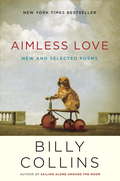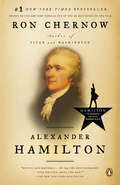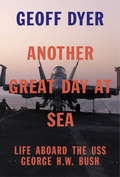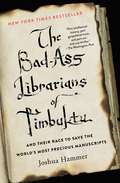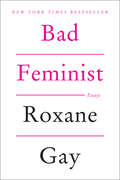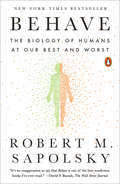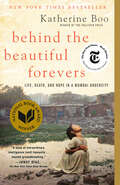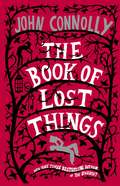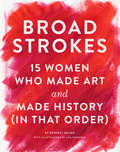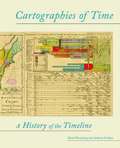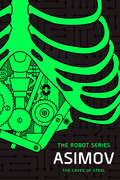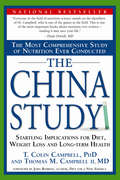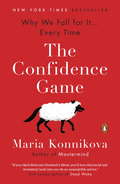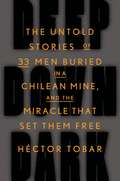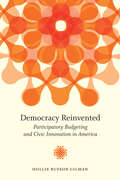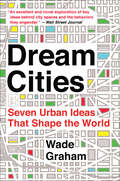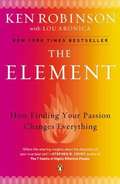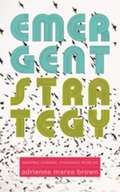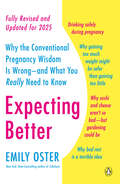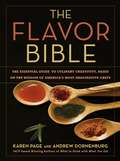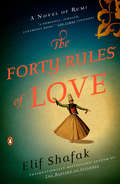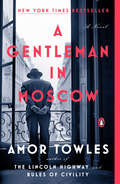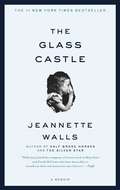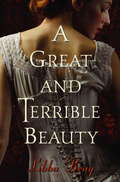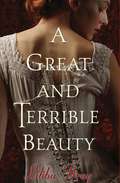Special Collections
Ted.com Recommended Reads
- Table View
- List View
Aimless Love
by Billy Collins"Billy Collins puts the 'fun' back in 'profundity.' "--Alice FultonFrom the two-term Poet Laureate of the United States Billy Collins comes his first compilation of new and selected poems in twelve years. Aimless Love combines more than fifty new poems with selections from four previous books--Nine Horses, The Trouble with Poetry, Ballistics, and Horoscopes for the Dead. Collins's unmistakable voice, which brings together plain speech with imaginative surprise, is clearly heard on every page, reminding us how he has managed to enrich the tapestry of contemporary poetry and greatly expand its audience. His work is featured in top literary magazines such as The New Yorker, Poetry, and The Atlantic, and he sells out reading venues all across the country. Appearing regularly in The Best American Poetry series, his poems appeal to readers and live audiences far and wide and have been translated into more than a dozen languages. By turns playful, ironic, and serious, Collins's poetry captures the nuances of everyday life while leading the reader into zones of inspired wonder. In the poet's own words, he hopes that his poems "begin in Kansas and end in Oz." Touching on the themes of love, loss, joy, and poetry itself, these poems showcase the best work of this "poet of plenitude, irony, and Augustan grace" (The New Yorker).Envoy Go, little book, out of this house and into the world, carriage made of paper rolling toward town bearing a single passenger beyond the reach of this jittery pen and far from the desk and the nosy gooseneck lamp. It is time to decamp, put on a jacket and venture outside, time to be regarded by other eyes, bound to be held in foreign hands. So off you go, infants of the brain, with a wave and some bits of fatherly advice: stay out as late as you like, don't bother to call or write, and talk to as many strangers as you can.Praise for Aimless Love"America's favorite poet."--The Wall Street Journal "[Billy Collins's] poetry presents simple observations, which create a shared experience between [him] and his readers, while further revealing how he takes life's everyday humdrum experiences and makes them vibrant. While Collins's previous collections have already validated his brilliance and staying power as a poet, he continues to reveal an ever-growing maturity."--The Times Leader"In selections from his four most recent collections . . . and fifty-one glimmering new poems, former poet laureate and reader favorite Collins, the maestro of the running-brook line and the clever pivot, celebrates the resonance and absurdity of what might be called the poet's attention-surfeit disorder. . . . But Collins' droll wit is often a diversionary tactic, so that when he strikes you with the hard edge of his darker visions, you reel."--BooklistFrom the Hardcover edition.
Alexander Hamilton
by Ron ChernowA New York Times Bestseller, and the inspiration for the hit Broadway musical Hamilton!Pulitzer Prize-winning author Ron Chernow presents a landmark biography of Alexander Hamilton, the Founding Father who galvanized, inspired, scandalized, and shaped the newborn nation.In the first full-length biography of Alexander Hamilton in decades, Ron Chernow tells the riveting story of a man who overcame all odds to shape, inspire, and scandalize the newborn America. According to historian Joseph Ellis, Alexander Hamilton is “a robust full-length portrait, in my view the best ever written, of the most brilliant, charismatic and dangerous founder of them all.”Few figures in American history have been more hotly debated or more grossly misunderstood than Alexander Hamilton. Chernow’s biography gives Hamilton his due and sets the record straight, deftly illustrating that the political and economic greatness of today’s America is the result of Hamilton’s countless sacrifices to champion ideas that were often wildly disputed during his time. “To repudiate his legacy,” Chernow writes, “is, in many ways, to repudiate the modern world.” Chernow here recounts Hamilton’s turbulent life: an illegitimate, largely self-taught orphan from the Caribbean, he came out of nowhere to take America by storm, rising to become George Washington’s aide-de-camp in the Continental Army, coauthoring The Federalist Papers, founding the Bank of New York, leading the Federalist Party, and becoming the first Treasury Secretary of the United States.Historians have long told the story of America’s birth as the triumph of Jefferson’s democratic ideals over the aristocratic intentions of Hamilton. Chernow presents an entirely different man, whose legendary ambitions were motivated not merely by self-interest but by passionate patriotism and a stubborn will to build the foundations of American prosperity and power. His is a Hamilton far more human than we’ve encountered before—from his shame about his birth to his fiery aspirations, from his intimate relationships with childhood friends to his titanic feuds with Jefferson, Madison, Adams, Monroe, and Burr, and from his highly public affair with Maria Reynolds to his loving marriage to his loyal wife Eliza. And never before has there been a more vivid account of Hamilton’s famous and mysterious death in a duel with Aaron Burr in July of 1804.Chernow’s biography is not just a portrait of Hamilton, but the story of America’s birth seen through its most central figure. At a critical time to look back to our roots, Alexander Hamilton will remind readers of the purpose of our institutions and our heritage as Americans.“Nobody has captured Hamilton better than Chernow” —The New York Times Book Review From the Trade Paperback edition.
Another Great Day at Sea
by Geoff DyerFrom a writer "whose genre-jumping refusal to be pinned down [makes him] an exemplar of our era" (NPR), a new book that confirms his power to astound readers. As a child Geoff Dyer spent long hours making and blotchily painting model fighter planes. So the adult Dyer jumped at the chance of a residency aboard an aircraft carrier. Another Great Day at Sea chronicles Dyer's experiences on the USS George H.W. Bush as he navigates the routines and protocols of "carrier-world," from the elaborate choreography of the flight deck through miles of walkways and hatches to kitchens serving meals for a crew of five thousand to the deafening complexity of catapult and arresting gear. Meeting the Captain, the F-18 pilots and the dentists, experiencing everything from a man-overboard alert to the Steel Beach Party, Dyer guides us through the most AIE (acronym intensive environment) imaginable. A lanky Englishman (could he really be both the tallest and the oldest person on the ship?) in a deeply American world, with its constant exhortations to improve, to do better, Dyer brilliantly records the daily life on board the ship, revealing it to be a prism for understanding a society where discipline and conformity, dedication and optimism, become forms of self-expression. In the process it becomes clear why Geoff Dyer has been widely praised as one of the most original--and funniest--voices in literature. Another Great Day at Sea is the definitive work of an author whose books defy definition.From the Hardcover edition.
The Bad-Ass Librarians of Timbuktu
by Joshua Hammer**New York Times Book Review Editors' Choice** To save ancient Arabic texts from Al Qaeda, a band of librarians pulls off a brazen heist worthy of Ocean&’s Eleven in this &“fast-paced narrative that is…part intellectual history, part geopolitical tract, and part out-and-out thriller&” (The Washington Post) from the author of The Falcon Thief.In the 1980s, a young adventurer and collector for a government library, Abdel Kader Haidara, journeyed across the Sahara Desert and along the Niger River, tracking down and salvaging tens of thousands of ancient Islamic and secular manuscripts that were crumbling in the trunks of desert shepherds. His goal: preserve this crucial part of the world&’s patrimony in a gorgeous library. But then Al Qaeda showed up at the door. &“Part history, part scholarly adventure story, and part journalist survey…Joshua Hammer writes with verve and expertise&” (The New York Times Book Review) about how Haidara, a mild-mannered archivist from the legendary city of Timbuktu, became one of the world&’s greatest smugglers by saving the texts from sure destruction. With bravery and patience, Haidara organized a dangerous operation to sneak all 350,000 volumes out of the city to the safety of southern Mali. His heroic heist &“has all the elements of a classic adventure novel&” (The Seattle Times), and is a reminder that ordinary citizens often do the most to protect the beauty of their culture. His the story is one of a man who, through extreme circumstances, discovered his higher calling and was changed forever by it.
Bad Feminist
by Roxane Gay“Roxane Gay is so great at weaving the intimate and personal with what is most bewildering and upsetting at this moment in culture. She is always looking, always thinking, always passionate, always careful, always right there.” — Sheila Heti, author of How Should a Person Be?A New York Times BestsellerBest Book of the Year: NPR • Boston Globe • Newsweek • Time Out New York • Oprah.com • Miami Herald • Book Riot • Buzz Feed • Globe and Mail (Toronto) • The Root • Shelf AwarenessA collection of essays spanning politics, criticism, and feminism from one of the most-watched cultural observers of her generationIn these funny and insightful essays, Gay takes us through the journey of her evolution as a woman (Sweet Valley High) of color (The Help) while also taking readers on a ride through culture of the last few years (Girls, Django in Chains) and commenting on the state of feminism today (abortion, Chris Brown). The portrait that emerges is not only one of an incredibly insightful woman continually growing to understand herself and our society, but also one of our culture.Bad Feminist is a sharp, funny, and spot-on look at the ways in which the culture we consume becomes who we are, and an inspiring call-to-arms of all the ways we still need to do better, coming from one of our most interesting and important cultural critics.
Behave
by Robert M. SapolskyWhy do we do the things we do?Over a decade in the making, this game-changing book is Robert Sapolsky's genre-shattering attempt to answer that question as fully as perhaps only he could, looking at it from every angle. Sapolsky's storytelling concept is delightful but it also has a powerful intrinsic logic: he starts by looking at the factors that bear on a person's reaction in the precise moment a behavior occurs, and then hops back in time from there, in stages, ultimately ending up at the deep history of our species and its genetic inheritance.And so the first category of explanation is the neurobiological one. What goes on in a person's brain a second before the behavior happens? Then he pulls out to a slightly larger field of vision, a little earlier in time: What sight, sound, or smell triggers the nervous system to produce that behavior? And then, what hormones act hours to days earlier to change how responsive that individual is to the stimuli which trigger the nervous system? By now, he has increased our field of vision so that we are thinking about neurobiology and the sensory world of our environment and endocrinology in trying to explain what happened.Sapolsky keeps going--next to what features of the environment affected that person's brain, and then back to the childhood of the individual, and then to their genetic makeup. Finally, he expands the view to encompass factors larger than that one individual. How culture has shaped that individual's group, what ecological factors helped shape that culture, and on and on, back to evolutionary factors thousands and even millions of years old.The result is one of the most dazzling tours de horizon of the science of human behavior ever attempted, a majestic synthesis that harvests cutting-edge research across a range of disciplines to provide a subtle and nuanced perspective on why we ultimately do the things we do...for good and for ill. Sapolsky builds on this understanding to wrestle with some of our deepest and thorniest questions relating to tribalism and xenophobia, hierarchy and competition, morality and free will, and war and peace. Wise, humane, often very funny, Behave is a towering achievement, powerfully humanizing, and downright heroic in its own right.
Behind the Beautiful Forevers
by Katherine BooNEW YORK TIMES BESTSELLER • NATIONAL BOOK AWARD WINNER • ONE OF TIME&’S TEN BEST NONFICTION BOOKS OF THE DECADE • ONE OF THE NEW YORK TIMES&’S 100 BEST BOOKS OF THE 21ST CENTURY&“Inspiring . . . extraordinary . . . [Katherine Boo] shows us how people in the most desperate circumstances can find the resilience to hang on to their humanity. Just as important, she makes us care.&”—People&“A tour de force of social justice reportage and a literary masterpiece.&”—Judges, PEN/John Kenneth Galbraith Award ONE OF THE TEN BEST BOOKS OF THE YEAR BY The New York Times • The Washington Post • O: The Oprah Magazine • USA Today • New York • The Miami Herald • San Francisco Chronicle • NewsdayIn this breathtaking book by Pulitzer Prize winner Katherine Boo, a bewildering age of global change and inequality is made human through the dramatic story of families striving toward a better life in Annawadi, a makeshift settlement in the shadow of luxury hotels near the Mumbai airport.As India starts to prosper, the residents of Annawadi are electric with hope. Abdul, an enterprising teenager, sees &“a fortune beyond counting&” in the recyclable garbage that richer people throw away. Meanwhile Asha, a woman of formidable ambition, has identified a shadier route to the middle class. With a little luck, her beautiful daughter, Annawadi&’s &“most-everything girl,&” might become its first female college graduate. And even the poorest children, like the young thief Kalu, feel themselves inching closer to their dreams. But then Abdul is falsely accused in a shocking tragedy; terror and global recession rock the city; and suppressed tensions over religion, caste, sex, power, and economic envy turn brutal. With intelligence, humor, and deep insight into what connects people to one another in an era of tumultuous change, Behind the Beautiful Forevers, based on years of uncompromising reporting, carries the reader headlong into one of the twenty-first century&’s hidden worlds—and into the hearts of families impossible to forget. WINNER OF: The PEN Nonfiction Award • The Los Angeles Times Book Prize • The American Academy of Arts and Letters Award • The New York Public Library&’s Helen Bernstein Book AwardNAMED ONE OF THE BEST BOOKS OF THE YEAR BY The New Yorker • People • Entertainment Weekly • The Wall Street Journal • The Boston Globe • The Economist • Financial Times • Foreign Policy • The Seattle Times • The Nation • St. Louis Post-Dispatch • The Denver Post • Minneapolis Star Tribune • The Week • Kansas City Star • Slate • Publishers Weekly
The Book of Lost Things
by John ConnollyNew York Times bestselling author John Connolly's unique imagination takes readers through the end of innocence into adulthood and beyond in this dark and triumphantly creative novel of grief and loss, loyalty and love, and the redemptive power of stories.High in his attic bedroom, twelve-year-old David mourns the death of his mother, with only the books on his shelf for company. But those books have begun to whisper to him in the darkness. Angry and alone, he takes refuge in his imagination and soon finds that reality and fantasy have begun to meld. While his family falls apart around him, David is violently propelled into a world that is a strange reflection of his own—populated by heroes and monsters and ruled by a faded king who keeps his secrets in a mysterious book, The Book of Lost Things. Taking readers on a vivid journey through the loss of innocence into adulthood and beyond, New York Times bestselling author John Connolly tells a dark and compelling tale that reminds us of the enduring power of stories in our lives.
Broad Strokes
by Bridget QuinnHistorically, major women artists have been excluded from the mainstream art canon. Aligned with the resurgence of feminism in pop culture, Broad Strokes offers an entertaining corrective to that omission. Art historian Bridget Quinn delves into the lives and careers of 15 female artists from around the globe in text that's smart, feisty, educational, and an enjoyable read. Replete with beautiful reproductions of the artists' works and contemporary portraits of each artist by renowned illustrator Lisa Congdon, this is art history from the Renaissance to Abstract Expressionism for the modern art lover, reader, and feminist.
Cartographies of Time
by Daniel Rosenberg and Anthony GraftonOur critically acclaimed smash hit Cartographies of Time is now available in paperback. In this first comprehensive history of graphic representations of time, authors Daniel Rosenberg and Anthony Grafton have crafted a lively history featuring fanciful characters and unexpected twists and turns. From medieval manuscripts to websites, Cartographies of Time features a wide variety of timelines that in their own unique ways, curving, crossing, branching, defy conventional thinking about the form. A fifty-four-foot-long timeline from 1753 is mounted on a scroll and encased in a protective box. Another timeline uses the different parts of the human body to show the genealogies of Jesus Christ and the rulers of Saxony. Ladders created by missionaries in eighteenth-century Oregon illustrate Bible stories in a vertical format to convert Native Americans. Also included is the April 1912 Marconi North Atlantic Communication chart, which tracked ships, including the Titanic, at points in time rather than by their geographic location, alongside little-known works by famous figures, including a historical chronology by the mapmaker Gerardus Mercator and a chronological board game patented by Mark Twain. Presented in a lavishly illustrated edition, Cartographies of Time is a revelation to anyone interested in the role visual forms have played in our evolving conception of history
Caves of Steel
by Isaac AsimovA millennium into the future two advancements have altered the course of human history: the colonization of the galaxy and the creation of the positronic brain. Isaac Asimov's Robot novels chronicle the unlikely partnership between a New York City detective and a humanoid robot who must learn to work together. Like most people left behind on an over-populated Earth, New York City police detective Elijah Baley had little love for either the arrogant Spacers or their robotic companions. But when a prominent Spacer is murdered under mysterious circumstances, Baley is ordered to the Outer Worlds to help track down the killer. The relationship between Life and his Spacer superiors, who distrusted all Earthmen, was strained from the start. Then he learned that they had assigned him a partner: R. Daneel Olivaw. Worst of all was that the "R" stood for robot--and his positronic partner was made in the image and likeness of the murder victim!
The China Study
by T. Colin CampbellEven today, as trendy diets and a weight-loss frenzy sweep the nation, two-thirds of adults are still obese and children are being diagnosed with Type 2 diabetes, typically an "adult" disease, at an alarming rate. If we're obsessed with being thin more so than ever before, why are Americans stricken with heart disease as much as we were 30 years ago?In The China Study, Dr. T. Colin Campbell details the connection between nutrition and heart disease, diabetes, and cancer. The report also examines the source of nutritional confusion produced by powerful lobbies, government entities, and opportunistic scientists. The New York Times has recognized the study as the "Grand Prix of epidemiology" and the "most comprehensive large study ever undertaken of the relationship between diet and the risk of developing disease."The China Study is not a diet book. Dr. Campbell cuts through the haze of misinformation and delivers an insightful message to anyone living with cancer, diabetes, heart disease, obesity, and those concerned with the effects of aging.[This book is also available in Spanish, El Estudio de China.]
The Confidence Game
by Maria Konnikova"It’s a startling and disconcerting read that should make you think twice every time a friend of a friend offers you the opportunity of a lifetime.”—Erik Larson, #1 New York Times bestselling author of Dead Wake and bestselling author of Devil in the White CityThink you can’t get conned? Think again. The New York Times bestselling author of Mastermind: How to Think Like Sherlock Holmes explains how to spot the con before they spot you.“[An] excellent study of Con Artists, stories & the human need to believe” –Neil Gaiman, via Twitter A compelling investigation into the minds, motives, and methods of con artists—and the people who fall for their cons over and over again. While cheats and swindlers may be a dime a dozen, true conmen—the Bernie Madoffs, the Jim Bakkers, the Lance Armstrongs—are elegant, outsized personalities, artists of persuasion and exploiters of trust. How do they do it? Why are they successful? And what keeps us falling for it, over and over again? These are the questions that journalist and psychologist Maria Konnikova tackles in her mesmerizing new book. From multimillion-dollar Ponzi schemes to small-time frauds, Konnikova pulls together a selection of fascinating stories to demonstrate what all cons share in common, drawing on scientific, dramatic, and psychological perspectives. Insightful and gripping, the book brings readers into the world of the con, examining the relationship between artist and victim. The Confidence Game asks not only why we believe con artists, but also examines the very act of believing and how our sense of truth can be manipulated by those around us.From the Hardcover edition.
Deep Down Dark
by Héctor TobarWhen the San José mine collapsed outside of Copiapó, Chile, in August 2010, it trapped thirty-three miners beneath thousands of feet of rock for a record-breaking sixty-nine days. The entire world watched what transpired above-ground during the grueling and protracted rescue, but the saga of the miners' experiences below the Earth's surface--and the lives that led them there--has never been heard until now. For Deep Down Dark, the Pulitzer Prize-winning journalist Héctor Tobar received exclusive access to the miners and their tales. These thirty-three men came to think of the mine, a cavern inflicting constant and thundering aural torment, as a kind of coffin, and as a church where they sought redemption through prayer. Even while still buried, they all agreed that if by some miracle any of them escaped alive, they would share their story only collectively. Héctor Tobar was the person they chose to hear, and now to tell, that story. The result is a masterwork of narrative journalism--a riveting, at times shocking, emotionally textured account of a singular human event. Deep Down Dark brings to haunting, tactile life the experience of being imprisoned inside a mountain of stone, the horror of being slowly consumed by hunger, and the spiritual and mystical elements that surrounded working in such a dangerous place. In its stirring final chapters, it captures the profound way in which the lives of everyone involved in the disaster were forever changed.
Democracy Reinvented
by Hollie Russon GilmanParticipatory Budgeting—the experiment in democracy that could redefine how public budgets are decided in the United States. Democracy Reinvented is the first comprehensive academic treatment of participatory budgeting in the United States, situating it within a broader trend of civic technology and innovation. This global phenomenon, which has been called "revolutionary civics in action" by the New York Times, started in Brazil in 1989 but came to America only in 2009. Participatory budgeting empowers citizens to identify community needs, work withelected officials to craft budget proposals, and vote on how to spend public funds. Democracy Reinvented places participatory budgeting within the larger discussion of the health of U. S. democracy and focuses on the enabling political and institutional conditions. Author and former White House policy adviser Hollie Russon Gilman presents theoretical insights, indepth case studies, and interviews to offer a compelling alternative to the current citizen disaffection and mistrust of government. She offers policyrecommendations on how to tap online tools and other technological and civic innovations to promote more inclusive governance. While most literature tends to focus on institutional changes without solutions, this book suggests practical ways to empower citizens to become change agents. Reinvesting in Democracy also includes a discussion on the challenges and opportunities that come with using digital tools to re-engage citizens in governance.
Dream Cities
by Wade Graham“An excellent and novel exploration of key ideas behind city spaces and the behaviors they engender.” —Wall Street JournalFrom the acclaimed landscape designer, historian and author of American Eden, a lively, unique, and accessible cultural history of modern cities.Dream Cities explores our cities in a new way—as expressions of ideas, often conflicting, about how we should live, work, play, make, buy, and believe. It tells the stories of the real architects and thinkers whose imagined cities became the blueprints for the world we live in.From the nineteenth century to today, what began as visionary concepts—sometimes utopian, sometimes outlandish, always controversial—were gradually adopted and constructed on a massive scale in cities around the world, from Dubai to Ulan Bator to London to Los Angeles. Wade Graham uses the lives of the pivotal dreamers behind these concepts, as well as their acolytes and antagonists, to deconstruct our urban landscapes—the houses, towers, civic centers, condominiums, shopping malls, boulevards, highways, and spaces in between—exposing the ideals and ideas embodied in each.From the baroque fantasy villages of Bertram Goodhue to the superblocks of Le Corbusier’s Radiant City to the pseudo-agrarian dispersal of Frank Lloyd Wright’s Broadacre City, our upscale leafy suburbs, downtown skyscraper districts, infotainment-driven shopping malls, and “sustainable” eco-developments are seen as never before. Elegantly designed and illustrated, Dream Cities is a field guide to our modern urban world.“An intriguing architectural history.” —Kirkus Reviews“Enjoyable . . . well researched, posing an interesting historic tie from the past to the present.” —Washington Post“Absolutely engrossing.” —Ross King, author of Brunelleschi’s Dome
The Element
by Lou Aronica and Ken RobinsonA New York Times-bestselling breakthrough book about talent, passion, and achievement from the one of the world's leading thinkers on creativity and self-fulfillment. The Element is the point at which natural talent meets personal passion. When people arrive at the Element, they feel most themselves and most inspired and achieve at their highest levels. With a wry sense of humor, Ken Robinson looks at the conditions that enable us to find ourselves in the Element and those that stifle that possibility. Drawing on the stories of a wide range of people, including Paul McCartney, Matt Groening, Richard Branson, Arianna Huffington, and Bart Conner, he shows that age and occupation are no barrier and that this is the essential strategy for transforming education, business, and communities in the twenty-first century. Also available from Ken Robinson is Finding Your Element, the practical guide to achieving your highest potential.
Emergent Strategy
by Adrienne Maree BrownIn the tradition of Octavia Butler, here is radical self-help, society-help, and planet-help to shape the futures we want. Change is constant. The world, our bodies, and our minds are in a constant state of flux. They are a stream of ever-mutating, emergent patterns. Rather than steel ourselves against such change, Emergent Strategy teaches us to map and assess the swirling structures and to read them as they happen, all the better to shape that which ultimately shapes us, personally and politically. A resolutely materialist spirituality based equally on science and science fiction: a wild feminist and afro-futurist ride!adrienne maree brown, co-editor of Octavia’s Brood: Science Fiction from Social Justice Movements, is a social justice facilitator, healer, and doula living in Detroit.
Expecting Better: Why the Conventional Pregnancy Wisdom Is Wrong--and What You Really Need to Know
by Emily OsterWhat to Expect When You're Expecting meets Freakonomics: an award-winning economist disproves standard recommendations about pregnancy to empower women while they're expecting Pregnancyunquestionably one of the most profound, meaningful experiences of adulthoodcan reduce otherwise intelligent women to, well, babies. We’re told to avoid cold cuts, sushi, alcohol, and coffee, but aren’t told why these are forbidden. Rules for prenatal testing are hard and fastand unexplained. Are these recommendations even correct? Are all of them right for every mom-to-be? In Expecting Better, award-winning economist Emily Oster proves that pregnancy rules are often misguided and sometimes flat-out wrong. A mom-to-be herself, Oster debunks the myths of pregnancy using her particular mode of critical thinking: economics, the study of how we get what we want. Oster knows that the value of anythinga home, an amniocentesisis in the eyes of the informed beholder, and like any complicated endeavor, pregnancy is not a one-size-fits-all affair. And yet medicine often treats it as such. Are doctors working from bad data? Are well-meaning friends and family perpetuating false myths and raising unfounded concerns? Oster’s answer is yes, and often. Pregnant women face an endless stream of decisions, from the casual (Can I eat this?) to the frightening (Is it worth risking a miscarriage to test for genetic defects?). Expecting Better presents the hard facts and real-world advice you’ll never get at the doctor’s office or in the existing literature. Oster’s revelatory work identifies everything from the real effects of caffeine and tobacco to the surprising dangers of gardening. Any expectant mother knows that the health of her baby is paramount, but she will be less anxious and better able to enjoy a healthy pregnancy if she is informed . . . and can have the occasional glass of wine. * * * Numbers are not subject to someone else’s interpretationmath doesn’t lie. Expectant economist Emily Oster set out to inform parents-to-be about the truth of pregnancy using the most up-to-date data so that they can make the best decisions for their pregnancies. The results she found were often very surprising · It’s fine to have the occasional glass of wine even one every day in the second and third trimesters. · There is nothing to fear from sushi, but do stay away from raw milk cheese. · Sardines and herring are the fish of choice to give your child those few extra IQ points. · There is no evidence that bed rest is helpful in preventing or treating any complications of pregnancy. · Many unnecessary labor inductions could be avoided by simply staying hydrated. · Epidurals are great for pain relief and fine for your baby, but they do carry some risks for mom. · Limiting women to ice chips during labor is an antiquated practice; you should at least be able to sneak in some Gatorade. · You shouldn’t worry about dyeing your hair or cleaning the cat’s litter box, but gardening while pregnant can actually be risky. · Hot tubs, hot baths, hot yoga: avoid (at least during the first trimester). · You should be more worried about gaining too little weight during pregnancy than gaining too much. · Most exercise during pregnancy is fine (no rock climbing!), but there isn’t much evidence that it has benefits. Except for exercising your pelvic floor with Kegels: that you should be doing. · Your eggs do not have a 35-year-old sell-by date: plenty of women get pregnant after 35 and there is no sudden drop in fertility on your birthday. · Miscarriage risks from tests like the CVS and Amniocentesis are far lower than cited by most doctors. · Pregnancy nausea may be unpleasant, but it’s a good sign: women who are sick are less likely to miscarry. .
The Flavor Bible
by Karen Page and Andrew DornenburgWinner of the 2009 James Beard Book Award for Best Book: Reference and Scholarship
Great cooking goes beyond following a recipe--it's knowing how to season ingredients to coax the greatest possible flavor from them. Drawing on dozens of leading chefs' combined experience in top restaurants across the country, Karen Page and Andrew Dornenburg present the definitive guide to creating "deliciousness" in any dish. Thousands of ingredient entries, organized alphabetically and cross-referenced, provide a treasure trove of spectacular flavor combinations.
Readers will learn to work more intuitively and effectively with ingredients; experiment with temperature and texture; excite the nose and palate with herbs, spices, and other seasonings; and balance the sensual, emotional, and spiritual elements of an extraordinary meal.Seasoned with tips, anecdotes, and signature dishes from America's most imaginative chefs, THE FLAVOR BIBLE is an essential reference for every kitchen.
The Forty Rules of Love
by Elif ShafakListen to Elif Shafak's The Forty Rules of Love reviewed on NPR In this lyrical, exuberant follow-up to her 2007 novel, The Bastard of Istanbul, acclaimed Turkish author Elif Shafak unfolds two tantalizing parallel narratives--one contemporary and the other set in the thirteenth century, when Rumi encountered his spiritual mentor, the whirling dervish known as Shams of Tabriz--that together incarnate the poet's timeless message of love. Ella Rubenstein is forty years old and unhappily married when she takes a job as a reader for a literary agent. Her first assignment is to read and report on Sweet Blasphemy, a novel written by a man named Aziz Zahara. Ella is mesmerized by his tale of Shams's search for Rumi and the dervish's role in transforming the successful but unhappy cleric into a committed mystic, passionate poet, and advocate of love. She is also taken with Shams's lessons, or rules, that offer insight into an ancient philosophy based on the unity of all people and religions, and the presence of love in each and every one of us. As she reads on, she realizes that Rumi's story mirrors her own and that Zahara--like Shams--has come to set her free.
A Gentleman in Moscow
by Amor TowlesHe can't leave his hotel. You won't want to. From the New York Times bestselling author of Rules of Civility--a transporting novel about a man who is ordered to spend the rest of his life inside a luxury hotel.
In 1922, Count Alexander Rostov is deemed an unrepentant aristocrat by a Bolshevik tribunal, and is sentenced to house arrest in the Metropol, a grand hotel across the street from the Kremlin.
Rostov, an indomitable man of erudition and wit, has never worked a day in his life, and must now live in an attic room while some of the most tumultuous decades in Russian history are unfolding outside the hotel's doors.
Unexpectedly, his reduced circumstances provide him entry into a much larger world of emotional discovery. Brimming with humor, a glittering cast of characters, and one beautifully rendered scene after another, this singular novel casts a spell as it relates the count's endeavor to gain a deeper understanding of what it means to be a man of purpose.
A New York Times Bestseller
The Glass Castle
by Jeannette WallsJeannette Walls grew up with parents whose ideals and stubborn nonconformity were both their curse and their salvation. Rex and Rose Mary Walls had four children. In the beginning, they lived like nomads, moving among Southwest desert towns, camping in the mountains.
Rex was a charismatic, brilliant man who, when sober, captured his children's imagination, teaching them physics, geology, and above all, how to embrace life fearlessly. Rose Mary, who painted and wrote and couldn't stand the responsibility of providing for her family, called herself an "excitement addict." Cooking a meal that would be consumed in fifteen minutes had no appeal when she could make a painting that might last forever.
Later, when the money ran out, or the romance of the wandering life faded, the Walls retreated to the dismal West Virginia mining town--and the family--Rex Walls had done everything he could to escape. He drank. He stole the grocery money and disappeared for days. As the dysfunction of the family escalated, Jeannette and her brother and sisters had to fend for themselves, supporting one another as they weathered their parents' betrayals and, finally, found the resources and will to leave home.
What is so astonishing about Jeannette Walls is not just that she had the guts and tenacity and intelligence to get out, but that she describes her parents with such deep affection and generosity. Hers is a story of triumph against all odds, but also a tender, moving tale of unconditional love in a family that despite its profound flaws gave her the fiery determination to carve out a successful life on her own terms. For two decades, Jeannette Walls hid her roots. Now she tells her own story. A regular contributor to MSNBC.com, she lives in New York and Long Island and is married to the writer John Taylor.
A New York Times Bestseller
A Great and Terrible Beauty
by Libba BrayIt's 1895, and after the death of her mother, 16-year-old Gemma Doyle is shipped off from the life she knows in India to Spence, a proper boarding school in England. Lonely, guilt-ridden, and prone to visions of the future that have an uncomfortable habit of coming true, Gemma's reception there is a chilly one. To make things worse, she's being followed by a mysterious young Indian man, a man sent to watch her. But why? What is her destiny? And what will her entanglement with Spence's most powerful girls - and their foray into the spiritual world - lead to?
A Great and Terrible Beauty
by Libba BrayIt's 1895, and after the death of her mother, 16-year-old Gemma Doyle is shipped off from the life she knows in India to Spence, a proper boarding school in England. Lonely, guilt-ridden, and prone to visions of the future that have an uncomfortable habit of coming true, Gemma's reception there is a chilly one. To make things worse, she's being followed by a mysterious young Indian man, a man sent to watch her. But why? What is her destiny? And what will her entanglement with Spence's most powerful girls - and their foray into the spiritual world - lead to?
